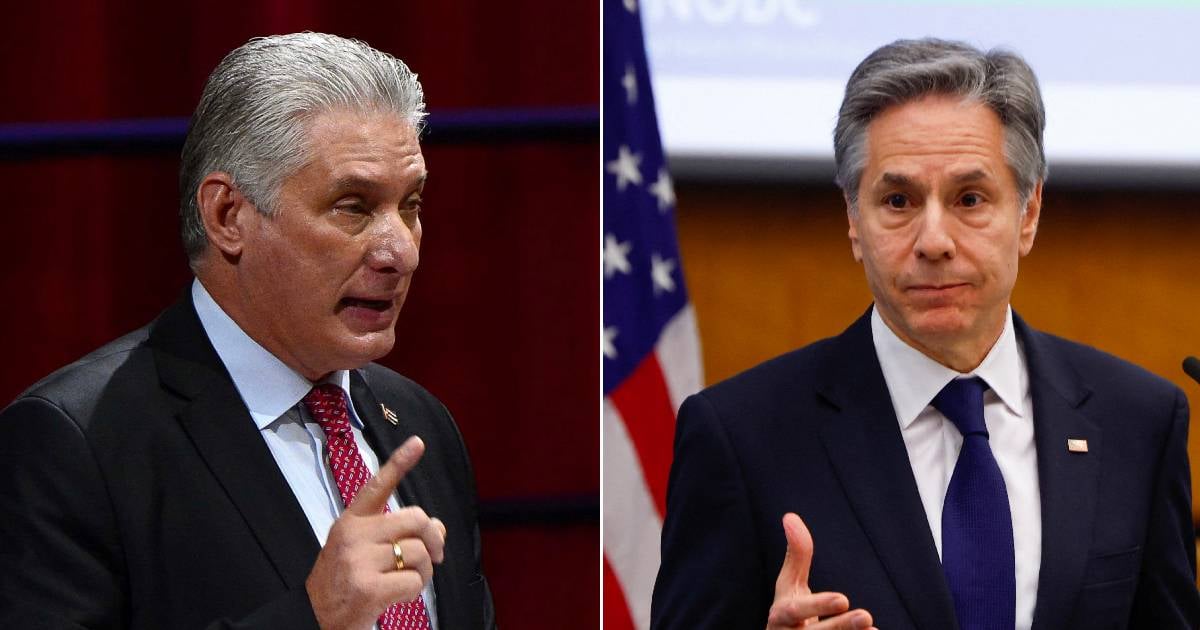Miguel Díaz-Canel, the leader of Cuba, has responded to U.S. Secretary of State Antony Blinken for keeping the island nation at the highest alert level in the Trafficking in Persons Report. He claims this is a "maneuver in the open war against Cuban medical collaboration."
"The empire has once again listed #Cuba in its manipulative Trafficking in Persons Report. Outrageous maneuver in the open war against Cuban medical collaboration. Enough of the cynicism, @SecBlinken. You are well aware of our #ZeroTolerance policy towards this criminal practice," Díaz-Canel stated in a message on social media.
In his statement, the Cuban president accused the United States of using the report manipulatively as part of a campaign against Cuba’s medical collaboration, which Havana defends as a humanitarian effort. The regime insists that the deployment of doctors to other countries is part of a "medical collaboration," implying it is free of charge. However, it is well-known that Havana charges substantial sums for these missions, while the doctors receive only a small percentage of the earnings.
The State Department's report, released this Tuesday, confirmed that Cuba remains at Tier 3, the highest level, for failing to meet the minimum standards for the elimination of human trafficking. This level indicates that the Cuban government is not making significant efforts to address the issue and continues to engage in practices that facilitate and profit from forced labor.
Although the Cuban government approved the National Action Plan (NAP) 2023-2026 to combat human trafficking, the measures taken so far have been deemed insufficient in light of accusations that the country benefits from forced labor, especially through its labor export program, including controversial medical missions abroad.
The report reveals that the Cuban government continues to deploy workers under coercive and deceptive conditions. These workers, many of whom are health professionals, often have their passports and professional credentials confiscated, are subjected to strict curfews and surveillance, and receive wages far below what was promised. The government retains a significant portion of their salaries and fails to adequately inform them about the terms of their contracts, which vary from country to country.
Moreover, authorities threaten and punish workers and their families if they attempt to leave the program. These practices have been widely documented by victims, NGOs, international organizations, and foreign governments, who accuse Cuban officials of facilitating severe human rights abuses and forced labor.
One of the most troubling aspects is that the Cuban government continues to send its citizens to work under exploitative conditions in countries in Africa, Asia, Latin America, and the Caribbean, among others, while evading requests for clarification from international rapporteurs who have sought explanations regarding these medical missions. In many of these destinations, Cuban workers are used in programs that border on modern slavery. These programs are presented as solidarity missions but are, in reality, labor exploitation mechanisms that generate significant income for the Cuban government, the report highlighted.
The Cuban government has shown a significant decline in efforts to prosecute and convict human trafficking crimes. According to the most recent official data, in 2022 only six sex trafficking victims were identified, the lowest number in a decade. Additionally, there were no reports of investigations, prosecutions, or convictions for labor trafficking.
Article 363.1 of the Cuban penal code penalizes labor trafficking and some forms of sex trafficking with prison terms ranging from seven to 15 years. However, the law lacks clear provisions for cases of child sex trafficking, making it difficult to effectively protect these minors.
Despite the severity of these accusations, Cuban authorities have not made sufficient efforts to investigate or prosecute those responsible for these crimes. In many cases, government officials themselves are involved in trafficking networks, creating an environment of impunity and further complicating the fight against these practices. According to the State Department report, this complicity not only facilitates labor and sexual exploitation but also deters victims from reporting abuses for fear of reprisals.
Understanding Cuba's Human Trafficking Issue
To provide more clarity on the human trafficking situation involving Cuba, here are some frequently asked questions along with their answers.
Why is Cuba listed at Tier 3 in the Trafficking in Persons Report?
Cuba is listed at Tier 3 because it fails to meet the minimum standards for the elimination of human trafficking and continues to engage in practices that facilitate and profit from forced labor.
What are the conditions faced by Cuban workers deployed abroad?
Cuban workers deployed abroad often face coercive and deceptive conditions, including confiscation of passports and professional credentials, strict curfews, surveillance, and wages far below what was promised. The government also retains a significant portion of their salaries.
How does the Cuban government respond to accusations of human trafficking?
The Cuban government generally denies the accusations and defends its deployment of workers abroad as humanitarian efforts. It has shown a lack of sufficient efforts to investigate or prosecute those responsible for human trafficking.
What legal measures does Cuba have against human trafficking?
Cuba's penal code includes Article 363.1, which penalizes labor trafficking and some forms of sex trafficking with prison terms ranging from seven to 15 years. However, it lacks clear provisions for cases of child sex trafficking.
